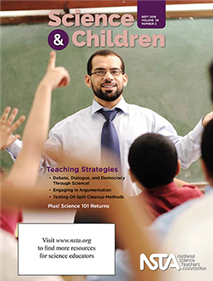All Middle School resources
Journal Article
Multimedia Connected STEM Learning With Middle School Students
Find out how Denver middle school students practiced digital storytelling as they delved deeply into STEM topics that interested them. ...
By Janelle M. Johnson, Jayme Margolin-Sneider, and Monica Moreno-Martinez
NSTA Kids
Come along on a tour of the wonderful world of birds and their beaks. This book is the story of a child and two grown-up friends on a jaunt across their yard, in a park, past a pond, and through the pages of a photo album. Like them, you’ll find yo...
Blog Post
Shoes! Beaks! They’re All About Structure and Function
As we watch students arrive for class, we notice that Alejandra hangs her jacket on a coat hook, while Calder reaches for scissors to make a fringe on his picture. Tessa replaces her rain boots with the sneakers from her cubby, and Nick searches for ...
By Cindy Workosky
Blog Post
Exploring Structure and Function in Insects
As an entomologist, one of my greatest challenges is trying to overcome my students’ feelings of fear and disgust regarding insects. Insects often have negative images in society. Walk through any toy store, and you will likely find plastic insects...
By Cindy Workosky
Journal Article
Integrating Technology: The Innovative Utensil Challenge
This column shares how teachers use technology for assessment, student learning, or classroom management. This article talks about creating innovative problem-solvers....
Interactive E-book Kids
It is the year 2095, and Great Uncle Dar has just taken up the post of chief engineer on the solar system’s first inflatable space apartment building. Even better, his nephew, Peter, is spending the summer with him! Excited to catch up with Great U...
Blog Post
Anyone who teaches middle school students knows they have a lot of energy, and a lot of hot air. Why not put it to use? In this activity, students will be challenged to modify a simple plastic balloon racer to travel farther and faster. Students begi...
By Cindy Workosky
Blog Post
Scaffolding the Practice of Asking Questions and Defining Problems
With the adoption of the Next Generation Science Standards (NGSS), teachers are wondering how to teach their students to do the science and engineering practices (SEPs). Some SEPs, such as carrying out investigations and analyzing data, are a natural...
By Cindy Workosky
NSTA Press Book
Reading Nature: Engaging Biology Students With Evidence From the Living World
By making room for this book in your curriculum, you’ll have a fresh way to motivate your students to look at the living world and ask not only “Why?” but also “How do we know?” Unique in both its structure and approach, Reading Nature is a...
By Matthew Kloser, Sophia Grathwol
Journal Article
This column provides background science information for elementary teachers. This issue discusses phenomenon-based learning and activities to use in the science classroom....






